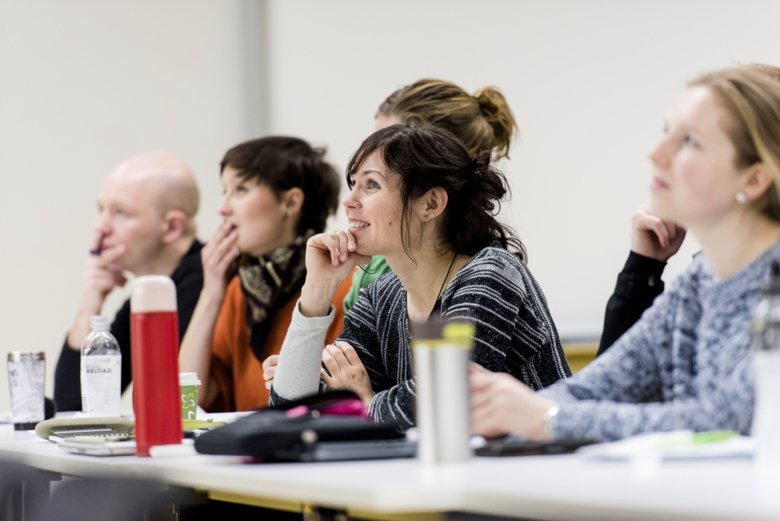Exchange Studies - Master's Programme in Biomedicine
If you are interested in exchange studies keep an eye on this page. Here the international coordinator posts information regarding the application process as well as invitations to information meetings where you can find out more about our partner universities, the application process, and stipends among others.

Application
Information and forms for application for exchange studies on the Master's Program in Biomedicine
 Photo: Campusfotografen
Photo: CampusfotografenAccreditation
Information about applying for accreditation of elective courses.
 Photo: GettyImages.
Photo: GettyImages.Q&A
Questions and answers regarding the application.
The International Committee of the Biomedicine Programmes (BIONK)
The International Committee of the Biomedicine Programmes (BIONK) is responsible for exchange studies in the Biomedicine Programmes. BIONK consists of teachers, international coordinators, the programme administrator, and student representatives. BIONK signs exchange agreements with partners universities, decides about rules for participation and selection of students for the exchange programmes, etc.
In the field of Biomedicine, you have the opportunity to spend part of your studies abroad. Completing a course or doing project work in another country is a unique experience compared to studying in Sweden. Experiencing another culture from the inside is a fantastic way of learning more about yourself and your field of study. Studying abroad means not only academic development, it also provides insights and experiences you will profit from in your future life - both professionally and personally. You will also make lifelong friends and many other interesting contacts. If you are considering studying abroad, it is important that you consider how you will deal with unforeseen events. An exchange student should be flexible and be able to take initiative.
For general information on exchange studies through KI, read more on:
Study Abroad at Karolinska Institutet
Studera utomlands genom Karolinska Institutet (Swedish)
Deadline for applications 2024/2025
The last day to apply for exchange studies during the academic year of 2024/25 is Friday January 26th at 11.00am.
The application will open in the end of December and the application link will be found here.
Please follow this link to find you where you can go on exchange during the academic year 2024/2025.
Until then you can prepare yourself by collecting the necessary documents. You can also read the exchange reports from previous exchange students and benefit from their experience.
Summer courses
Our partner universities organize summer courses. More information can be found here.

Partner universities 2026/2027
Please note that the information about the partner universities is continuously being updated.
The list of partner universities can be found here.
At the Master’s Programme in Biomedicine you can participate in exchange studies at universities in the Nordic countries, Europe, Asia, Oceania, and North America. You have the option to go on exchange in either the third semester or the fourth semester (see links in the right hand column).
The exchange reports are a great source of information where previous exchange students write about their experiences abroad.
Exchange places for students in the Master’s programme in Biomedicine
Most of the exchange agreements within Biomedicine, and the number of exchange places stated in the agreements, are shared between the Bachelor’s and Master’s programmes. Therefore, the number of exchange places allocated to the Master's programme in Biomedicine can differ from the number of places as seen on the list of partner universities on the link below.
See the current list of partner universities and available places in the list here.
AUSTRALIA
Read about studying and living in Australia, watch stories from other students, and learn about Australian education on the official Australian Government website for international students.
Monash University, (Melbourne-Australia)
A minimum of average grade "B" is a requirement. Specific requirements for exchange students can be found here.
The Dept. of Biomedicine provides the following online booklet with all research areas and contact details for Biomedicine Honours students in 2018.
The University of Sydney, (Sydney-Australia)
AUSTRIA
Learn about studying in Austria on the Study in Austria web site.
Medizinische Universität Innsbruck
BRAZIL
Study in Brazil provides more information about life as a student in Brazil.
Read information for incoming exchange students here.
CANADA
Find out about studying in Canada on the EduCanada web site.
Please note that it is not possible to go on exchange to Toronto in semester 3.
DENMARK
Read about what life would be like studying in Denmark at Study in Denmark.
Information for exchange students is available here.
- Broad range of courses on offer – the Faculty of Science offers approx. 600 English-taught courses a year most of which are available to exchange students.
- Most English-taught courses are master’s level courses.
- Exchange students can choose from the full range of courses offered by all the departments at the faculty – provided they meet the requirements. The course catalogue is available here.
- Students can do individual study/research projects of 7,5, 15, 22,5, 30, 45 and 60 ECTS.
Information for incoming exchange students can be found here, and instructions for how to apply here.
FINLAND
Learn more about studying in Finland on the Study in Finland web site.
Turun Yliopisto (University of Turku/Åbo)
FRANCE
Practical information and facts about studying in France is available on Campus France.
Ecole Normale Superieure de Lyon (ENSL)
See information regarding exchange studies here.
Université Pierre et Marie Curie (Paris 6)
Previous research experience is a requirement.
French language skills not a requirement.
GERMANY
Study in Germany provides information, student stories, and tips about student life in Germany.
Georg-August-Universität Göttingen
Information regarding exchange studies is available here.
Ruprecht-Karls-Universität Heidelberg
GREAT BRITAIN
You can find information about studying in Scotland on the web site Study in Scotland.
The University of Edinburgh, Scotland
Information for incoming exchange students can be found here, and specifically for Erasmus exchange students here.
IRELAND
Find out about studying in Ireland on the web site Education in Ireland.
University of Dublin - Trinity College Dublin
Information for inbound exchange students can be found here.
ITALY
Università Degli Studi di Milano
JAPAN
Study in Japan provides information about life as a student in Japan.
See information for international students here.
LITHUANIA
Here you can see a presentation about exchange studies at the University of Vilnius.
NORWAY
Read more about studying in Norway on the Study in Norway web site.
Read about admission to exchange studies here.
SAUDI ARABIA
King Abdullah University of Science and Technology (KAUST)
KI and the international committee for the study programmes in Biomedicine has just signed an agreement with King Abdullah University of Science and Technology (KAUST) in Saudi Arabia. KAUST is offering master’s students in Biomedicine to do their degree project at KAUST, fully financed, via the KAUST Visiting Student Research Program (VSRP) internship. The projects can be done within the Biological and Environmental Science and Engineering Division (BESE).
SINGAPORE
Nanyang University of Technology
If you do a project you have to find a supervisor before applying for exchange. More information about NTU and the application can be found here: NTU
National University of Singapore
If you do a project you have to find a supervisor before applying for exchange.
See specific information from the International Office at NUS here.
SPAIN
SWITZERLAND
ETH - Swiss Federal Institute of Technology, Zurich
Information for incoming exchange students is available here.
Switzerland is no longer participating in the Erasmus+ Programme, but student exchange is continued within the Swiss-European Mobility Programme.
- Students can find supervisors/projects in Pharmaceutical Sciences, or other areas if no projects can be found within this area.
- Students should contact ETH for further instructions if they are applying for projects that are not within Pharmaceutical Sciences (only Pharmaceutical Sciences will appear in the application system).
- Students should look for a suitable project on the website of the Department or Institute the student is interested in joining, and contact respective professors or senior scientists directly.
- Some projects offered at ETH Zurich are also published by SiROP (https://siropglobal.org/).
THE NETHERLANDS
Study in Holland provides ample information about studying in Holland and practical matters relating to the study experience.
Please note: may be difficult to find projects within Neuroscience.
Options for exchange studies within the Master’s Programme in Biomedicine
Students apply for exchange studies in competition, where the students are ranked and nominated according to their ranking and choice of exchange university. Nominated students that are accepted by their exchange university can apply for a stipend from KI or Erasmus, depending on the location of the university, and will not pay any tuition fees. Students must have studied for one year at KI prior to their exchange, and exchange studies are only allowed for one semester.
Exchange options for the Master’s Programme in Biomedicine at KI are as follows:
- Mobility (freemover) during the second semester (Frontiers in Biomedicine: Research Project 1)
- Mobility (freemover) during the third semester (Frontiers in Biomedicine: Research Project 2)
- Exchange studies (officially nominated) during the fourth semester
Here is the list of universities with which we have an agreement.

Options for exchange studies during the second and third semester (freemover)
If you wish to do an internship in semester 2 during the course Frontiers in Biomedicine: Research Project 1 (15 ECTS/10 weeks) or 3 during the course Frontiers in Biomedicine: Research Project 2 (15 ECTS/10 weeks) you can only go abroad as freemover. Please see this page for further information regarding freemovers. Please observe that the student is responsible for all the paperwork related to the internship. The student is responsible for any costs related to tuition fees, bench fees, etc. Before contacting the international coordinator for further assistance with insurance and stipend (only for internships within the European Community), the student need to have finalized the Learning Agreement and have received a Letter of Invitation no later than 4-6 weeks before departure (this includes also any possible visa).
Eligibility for exchange studies during the second semester
In order to be eligible for exchange studies in semester 2 you must have fulfilled the following criteria by April 15th:
- passed all courses in semester 1
- be registered for all courses in semester 2 that start before April 15th
Eligibility for exchange studies during the third semester
In order to be eligible for exchange studies in semester 3 you must have fulfilled the following criteria by April 15th:
- passed all courses in semester 1
- be registered for all courses in semester 2 that start before September 15th
Accreditation of exchange studies in the third semester
After exchange studies in the third semester you must send in applications for accreditation of the 9 credits of elective courses (this application should be sent to the Programme Officer) and the 16 credit research project (this application should be sent to the course leader for the 16 credits research project, Ute Römling). More information about accreditation and the credit transfer application form can be found on the following web pages:
http://ki.se/en/education/accreditation-regulations
http://ki.se/en/education/administrative-forms
Please contact the Programme Officer (Malin Sandell) if you have any questions regarding accreditation.
Options for exchange studies during the fourth semester
Exchange during the fourth semester: 30 credits (20 weeks) degree project
- The Master’s thesis will be examined and graded at KI, and the student is registered for the degree project course at KI and not formally as an exchange student in Ladok. The student will not be entitled to additional loans from CSN for studies abroad, but can apply for the usual stipend from KI (the sum is dependent on the location of the exchange university). The student must comply with the requirements for the degree project (which are documented on the course web page) and submit a project plan etc. to the course leader (Andreas Lennartsson) according to the instructions. While at the exchange university the student studies within a KI agreement, tuition fees are waived and in the majority of cases help is provided with finding accommodation.
- Officially no credits are taken as an exchange student (the full semester is examined at KI).
- The student is entitled to an exchange stipend from KI and does not need to pay tuition fees at the exchange university and will in the majority of cases receive help in finding accommodation, but will have no right to additional loans from CSN.
- At some exchange universities the student will perform a project that will also be assessed at the exchange university (this is a requirement for becoming an exchange student at some universities) and will receive formal credits from the exchange university, in addition to the assessment and credits awarded at KI.
Alternative option during the fourth semester:
- A student registered at KI for their degree project can collect data for their Master’s thesis at another university/company at KI or abroad. If a student selects this option, it is not a formal exchange, meaning that there is no additional support beyond that which is provided to students who collect their data at KI. If a student collects data for their Master’s thesis in this fashion they must have a supervisor on site, but in addition, they are also required to have a mentor/supervisor at KI.
- If you do not want to apply for the exchange places on offer, you can apply independently for a place as a ”freemover” at a university abroad. There are no formal restrictions on this, although you must expect to put in quite a lot of work in finding a university place abroad and arranging the exchange on your own. The advantages of applying for exchange places through BIONK are many: you normally do not have to pay the often high tuition fees that almost all universities charge and you will be studying at a university at which BIONK has good contacts and there is less paperwork. A student who applies independently must send for all the application forms and information and has to organise everything on his/her own .
Eligibility for exchange studies during the fourth semester
In order to be eligible for exchange studies in semester 4 you must have fulfilled the following criteria by September 15th:
- passed all courses in semesters 1 and 2
- be registered for all courses in semester 3 that start before September 15th
